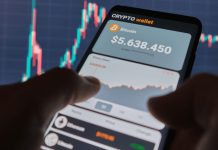Traders exchange their bitcoin for other cryptocurrencies or fiat currencies (US dollar or Euro). They can either leave bitcoin in exchange for quick trading access or store their holdings in an offline wallet. There are many factors to consider when choosing the right option.
The general premise is that traders buy and sell cryptocurrencies to make a relatively quick profit by taking advantage of the volatile nature of bitcoin valuations. The value of bitcoin can rise significantly or drop drastically, depending on the exchange used and overall market demand.
What Is Bitcoin Trading?
Bitcoin trading has no closing time, unlike traditional stock exchanges. It runs 24/7, so there are no closing times for quick trades. It is also unregulated. Therefore, it is much easier to begin trading. There is no need for drawn-out verification protocols.
There are three major bitcoin trading methods.
- The first, day trading, is a trader making multiple trades throughout the day, trying to make profits from short price movements. They usually leave bitcoin in exchange.
- Second, scalping is making a profit from small price changes. Traders sometimes make hundreds of these small trades each day.
- Thirdly, swing trading is a long-term approach. Traders enter trades at the start of a price movement and stay until the movement dies down when they collect the profit.
Custodial vs Non-Custodial Bitcoin Holdings

Traders need to have access to their crypto to exchange or trade. They could leave bitcoin in exchange with a third party (custodial holdings) or keep their holdings in an offline wallet (non-custodial holdings).
A trader gives an exchange the responsibility of protecting their bitcoin holdings. It is also more convenient for traders looking to make short-term trades because the BTC is easily accessible in the exchange.
On the downside, online exchanges are prone to cyberattacks. Traders and investors might lose their holdings in a compromised exchange.
Non-custodial holdings are not in exchange. Only a trader or investor has access to their holdings in a wallet. Keeping an offline wallet is best. It is also impossible for hackers to gain access to it.
Bitcoin Wallets
There are many types of bitcoin wallets. These include online (hot) wallets, software wallets, hardware wallets, multi-signature wallets, and paper wallets.
Each wallet contains private keys. Account holders use these private keys to spend bitcoin, so many of these keys are in each wallet. Private keys are like banknotes; people need them to make transactions.
Different wallets offer the storage of these keys for various purposes.
Hot wallets are for easy access. However, they are always online, so hackers might gain access to them.
In contrast, paper wallets are private keys printed on physical paper. Being offline greatly minimises the risk of theft.
Hardware wallets are computers that store private keys offline. They also process transactions offline. These are great options for a trader that wants extra security.
There are also multi-signature wallets that require two or more account holders to sign off on a transaction before the bitcoin is spent. These are cold storage wallets, so they offer offline security and another form of authentication.
Centralised or Decentralised Exchanges

Exchanges are locations where traders can exchange bitcoin for other currencies. Most exchanges offer bitcoin to ether (second largest cryptocurrency) trading pairs. However, the largest exchanges are fiat currencies to bitcoin trading pairs. It is a much easier method of obtaining bitcoin and entering the trading market.
Centralised exchanges are the third party that helps with transactions for traders and investors. They provide a platform for storing bitcoin holdings and give access to many potential trading partners. The exchange manages the funds of account holders. These exchanges protect all the bitcoin holdings on the platform. They provide insurance for all the bitcoin holdings in the exchange. Also, some exchanges provide cold (offline) bitcoin storage.
Decentralised exchanges (DEXs) have no third party and are purely peer-to-peer. DEXs process transactions through smart contracts. These are terms and conditions between buyers and sellers written in code. Both sides of the contract must be satisfied before a transaction is complete. Users trade directly, and some DEXs require traders to be on the platform when receiving funds.
These are also less prone to hacks. The exchange does not store funds, and there is no central database of holdings. This means that the exchange is distributed across many nodes in the network. This leads to less or no server downtime.
While these exchanges are less common, they are growing in popularity.
Secure Exchanges
As we mentioned, centralised exchanges are vulnerable to cyberattacks. Hackers target exchanges because they are easier to hack than banks. Exchanges often have millions of bitcoin holdings, so hackers also have the incentive to attack them.
Choosing a secure exchange when trading is better to limit the risk of losing your bitcoin due to a cyberattack. After all, secure exchanges are vital when traders leave bitcoin there. Secure exchanges have various security measures in place.

Exchanges should have a valid HTTPS (Hypertext Protocol Secure) certificate. This protocol prevents data from being modified or copied when being sent to a web server. HTTPS makes it difficult for hackers to access account information or even private keys stored in the exchange.
If an exchange has the certificate, you will see the HTTPS symbol on the top left side of the web browser.
Exchanges should also offer strong password creation. Users should be forced to create a password that contains upper- and lower-case letters, symbols, and special characters.
Additionally, exchanges should provide two-factor authentication. As an account holder, you could link another device to your account to confirm logins using Google or Microsoft Authenticator. This adds a layer of security.
Note, however, that you need to avoid using SMS authentication because hackers can easily gain access to mobile phone numbers.
Secure exchanges offer cold storage of bitcoin holdings. Most of the holdings in the exchange are kept offline, so hackers cannot get access to them. Account-holders can only leave bitcoin in exchange in small amounts for single-day trading and store the rest offline.
Some exchanges offer funds insurance, which protects the exchange from theft. The downside is that the policy only covers the entire exchange, not individual accounts.
Choosing Between Different Exchanges
Traders need to consider the features that exchanges offer to their clients. Centralised exchanges are user-friendly, easy to access, and have a large pool of trading partners. Their benefits slightly outweigh their shortcomings.
Exchanges have security protocols that minimise their risk of being hacked. Funds insurance ensures that the exchange does not lose all its holdings in the event of theft. Only storing a percentage of bitcoin holdings on the platform and the rest in cold storage is an added security measure.
DEXs are more secure, but there are limited amounts of these exchanges to choose from. Also, they are less user-friendly because users manage the funds.

To Leave Bitcoin In Exchanges Is Risky
Exchanges have many benefits, including access to potential trading partners and a marketplace to buy and sell different currencies. But there are risks involved when traders leave bitcoin in exchange.
For instance, in a centralised exchange, security is handled by the third party that runs the exchange. They manage all the bitcoin holdings and must ensure that the exchange is not hacked or that all the private keys are kept safe. Account holders also have no control over their private keys. Meaning they must go through the exchange when spending their bitcoin.
Some centralised exchanges offer cold storage for bitcoin holdings, but it is not a common practice. This means that account holders might lose all their holdings if they keep them in the exchange. A cyberattack could gain access to their accounts and drain all their funds.
Additionally, cyberattacks are not rare occurrences. Hackers have stolen over $1.65 billion worth of cryptocurrency over the last nine years. Exchanges are attractive to cybercriminals because there are millions of cryptocurrencies on them. They could drain an exchange’s holdings if they gain access to account holders’ private keys.
Centralised exchanges might also mismanage account-holders bitcoin. For example, they may misplace private keys held offline or lose access to the platform entirely. There is no guarantee that an exchange would refund any lost funds to their account holders if they leave bitcoin in exchange.
Decentralised exchanges rely solely on smart contracts. This removes the risk of third-party security. Even though it is safer to use than a centralised exchange, it lacks many of the latter’s advanced features.
Final Thoughts
Traders and investors need to consider whether their trades are short or long-term. Short-term traders should use a secure exchange with cold storage and funds insurance.
Long-term investors must store their bitcoin in paper, hardware, or software wallets to protect themselves from possible theft.
Traders and investors need to leave bitcoin in exchange only for short-term trades and never store large amounts of bitcoin in exchange.















